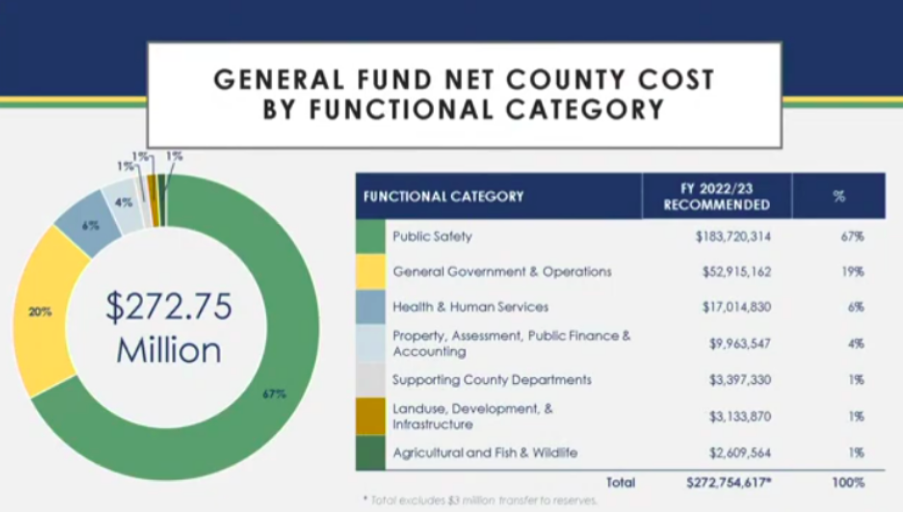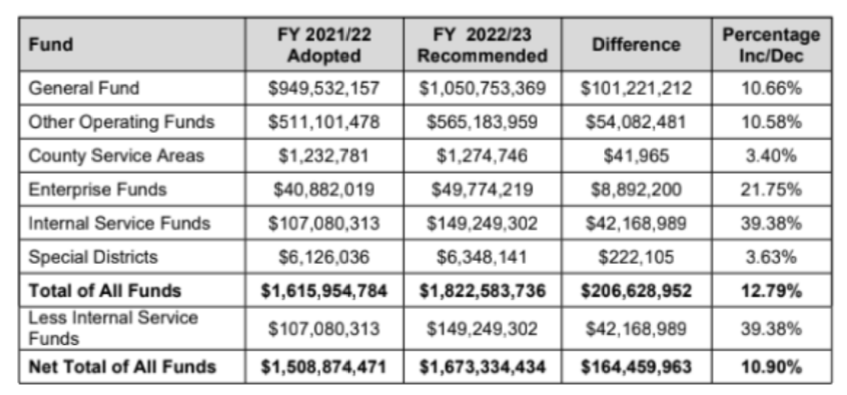
General Fund Net County Cost By Functional Category. Photo: Tulare County Budget Staff Presentation.
By Pedro Hernandez, Ivanhoe Sol
This September, the Tulare County Board of Supervisors approved the largest budget in county history.
Each year, every county government must undergo a public process to identify local priorities and approve a balanced budget for the new fiscal year.
Normally, the annual budget consists of locally–generated revenue such as property taxes and user fees for some county-owned utility districts. Additionally, counties receive funding from the state and federal government to address certain issues in the region. While certain funding sources have limitations such as only being able to be used for certain types of projects or within a specific timeframe, all funds are technically public.
Largest Budget In Tulare County History
The public budget hearing began with a presentation from Jason Britt, Tulare County Administrative Officer. He gave an overview of the proposed county budget and identified several budget allocations for Board consideration.
He said, “This is the first time our budget has crossed the billion dollar threshold.”
Despite the ongoing pressures from drought, COVID-19, and inflation, this year the General Fund budget increased from $949.5 million to $1.1 billion, an almost 11 percent increase from last year. WIth other funds taken into account the total operating budget for Tulare County is $1.82 billion. This budget represents an increase of $206.6 million, a 12.79 percent increase than last year.

County Budget Composition, Photo: Tulare County Budget Overview Presentation
Select highlights from the county budget include:
- Drought Response for county properties ($1.8 million)
- Five new Compressed Natural Gas busses for ($1.7 million)
- Road Fund County Transportation Improvement Program ($37.3 million)
- Park Improvements ($8.2 million)
- Energy Efficiency: ($55 million)
- Public Health Lab Expansion ($3.6 million)
While these buckets of projects demonstrate the different priorities that are funded, an overall analysis of the Tulare budget represents public safety costs from departments like the Tulare County Sherriffs and Fire Department absorbs the vast majority of the budget with 67% of the total net county costs.
Forward Looking: Fiscal Uncertainty
While this year was the largest budget in Tulare County history, Jason Britt identified several financial issues that pose potential burdens to the county budget in the coming years. These issues included rising labor costs, cost of law enforcement, new county programs, and uncertain impacts of drought on agriculture. For example Britt commented, “Minimum wage is rapidly increasing in the state…at some point that will continue to impact our ability to recruit staff unless we can match their minimum wage.”
This potential financial uncertainty was leveraged to limit spending. Britt continued his presentation with a strong message to “proceed with caution. Some experts say we’re in a recession, some say we’re not, some say we’re going to be in one, some say real estate will crash tomorrow.” Britt continued, “To maintain financial stability through an uncertain economy, and in constipation of growing operational costs and state-imposed obligations to general county revenue, it is recommended that the County proceed with caution and defer funding of new ongoing commitments.”
In response, Ivanhoe’s Supervisor Eddie Valero said, “Yes there are many things that we could include or that we need to tackle as well but my hope is that we’ll continue to forge forward and continue to include those items that are needed in the future.”
Public Comment: Transparency and Items Left Out of Budget Allocations
As a public process, a comment period began after Britt’s presentation to allow meeting participants to provide responses to the proposed budget. A total of four members of the public provided comments.
Elvia Olea, a policy advocate with the environmental justice organization Leadership Counsel for Justice and Accountability was the first to provide comment and set the tone for the rest of the commenters. She said “Many of the communities we work with are impacted by climate change and polluting industry”.
Olea and others reiterated a request for more time to engage the public. She said, “the county budget process provides an opportunity for county leaders and staff to learn about community priorities, to develop a comprehensive budget that reflects the needs of the community. In order to do so the County must engage in public process to ensure budget transparency and engagement opportunities for the public. THus we urge the county to provide a minimum of 30 days to review after today’s hearing before adopting the Tulare County Budget to ensure residents have the opportunity to engage in this public process.”
Elvia also made requests for other issues such as expanding funds for drought response to residents with dry wells, expanding eligibility for emergency water bottle programs, investment in green spaces, weatherization programs like air conditioning replacement, road improvements, sidewalks, and affordable housing.
Benjamin Perez from Tooleville also requested more time. For public review He said, “I’m speaking on behalf of my community, no one there speaks fluent English, they’re all farmworkers, and ninety percent of them are farmworkers… I’d like that period of time so I can go to my neighbors and show them what is going on.” He said that more time would help include smaller communities, “The smaller communities are always left out, as long as I’ve been paying attention to this.”
Maria Arrevalo, a resident of Pixley since 1968 requested that the Board, “Please let us take Pixley into account because we need your help a lot”. She also said there was several water-related issues in her community: “Pixley residents don’t qualify for the bottled water program….More importantly TCP filters for schools where our kids drink water, they are drinking contaminated water.”
County Supervisors Respond to Select Community Concerns
While County Supervisors did proactively respond to concerns about water funding to communities like Tooleville and Pixley, the request for extra time was dismissed.
Supervisor Pete Vander Poel requested that Jason Britt respond to the public with an overview of their engagement efforts. Britt responded with, “We post the budget ten days, this year it was actually twelve days, prior to today’s hearing online and we have budget books available in our office. We always try to get them out to the libraries. We’re not always successful and we can do a better job on that so people can review it before today….We rely on our departments to have a pulse on their communities and what they are requesting to be part of their budget requests. We may not always talk about it as the budget but that’s how we construct the budget.”
Britt also shared that due to the timing of the request, and extra 30 days was infeasible.
There are specific legal requirements, state law does not allow the county to adopt a budget after October 2nd so there couldn’t be 30 days after today.
Technically the County Supervisors had another two weeks before their next meeting (September 27th) which could have allowed additional time for more than four people to comment. The alternative was not discussed and without allowing additional time to make up for inadequate public outreach, the County Supervisors voted 5-0 to adopt the 2022-2023 Tulare County Budget.

Comments are closed.